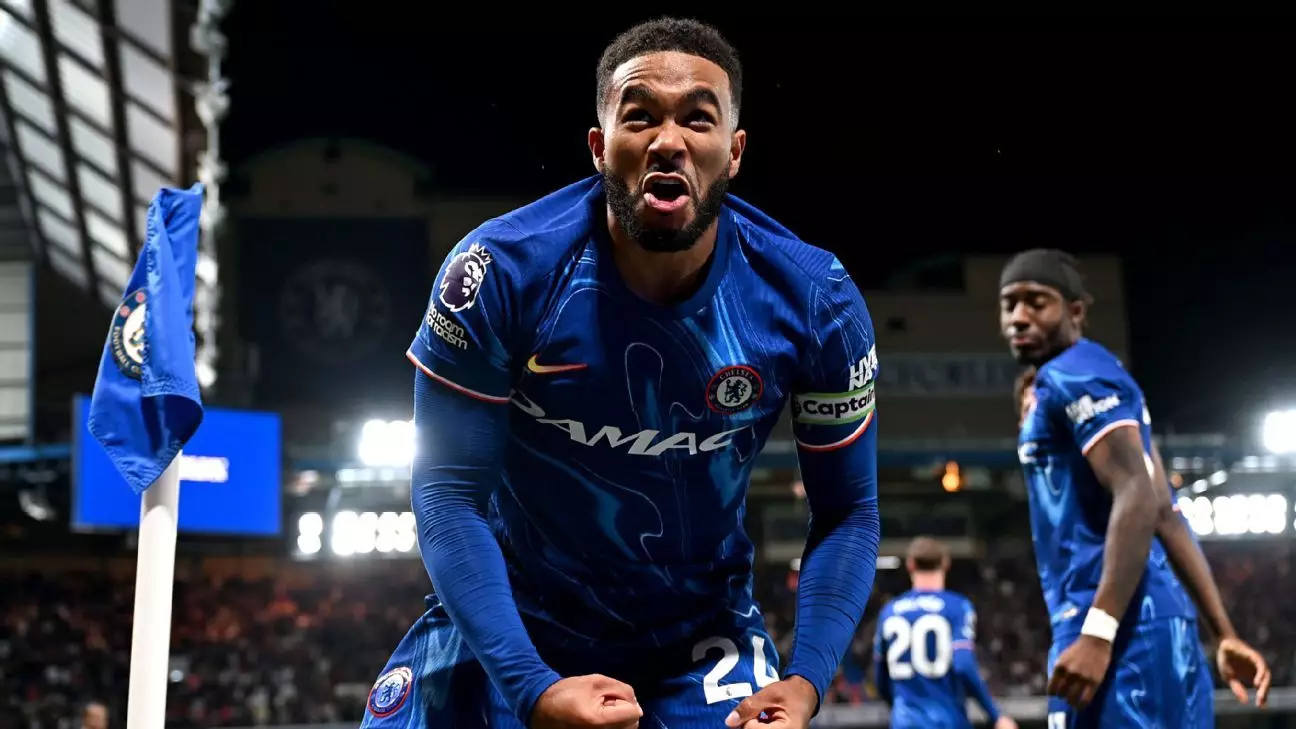Chelsea finds itself on a precarious journey toward Champions League qualification as they scrape by with a narrow 1-0 win over Manchester United. The inelegant nature of the victory raises pressing questions about the team’s dynamics, especially with Nicolas Jackson sidelined. A match that should have showcased Chelsea’s attacking prowess instead came across as shaky and devoid of confidence, spotlighting the urgent need for a rejuvenated strategy as they head into their next contest against Nottingham Forest.
The Blues managed to clinch the win thanks to a masterful assist from Reece James, whose cross was converted by Marc Cucurella—a goal emblematic of Chelsea’s struggles in finding consistent offensive rhythm. Despite James’ brilliance, which included an impressive shot that struck the post, one cannot ignore the lack of quality that characterized Chelsea’s overall performance. The Blues must elevate their game if they hope to secure a coveted spot in Europe’s premier competition.
New Faces, Old Problems: A Fresh Approach Required
With Jackson suspended due to a red card from an earlier match, Chelsea manager Enzo Maresca took a gamble by starting 19-year-old Tyrique George. While giving youth a chance is commendable, George’s performance raised more concerns than it answered. The young striker only managed a mere six touches in the first half, failing to make the impact that a striker is expected to deliver. In the cutthroat environment of the Premier League, such naiveté cannot be overlooked. Maresca might need to reconsider alternative formations or revert to more seasoned players like Cole Palmer or Pedro Neto, who, despite not being ideal options, could potentially provide the experience necessary for a more dynamic attack.
Maresca’s optimism about George’s performance, despite lacking notable contributions, reflects a potential disconnect between managerial aspirations and the team’s on-field reality. While nurturing young talent is essential for a club like Chelsea, the pressing need for immediate results in a highly competitive league may necessitate a more pragmatic approach.
Manchester United’s Struggles and the Battle for Identity
Across the pitch, Manchester United continues to stumble under the weight of expectations and dwindling morale. Under manager Ruben Amorim, the team has slid into a pit of disappointment, setting records no club wishes to hold: 17 losses in a single season and a record low points tally. The struggles of United mirror Chelsea’s, but whereas Chelsea are on the brink of European qualification, United appear to be spiraling further into chaos.
In a rather disheartening return to Stamford Bridge, Mason Mount faced a chorus of jeers from former fans, illustrating the fractious relationship that players can have with a club’s supporters when loyalty is superseded by decisions for financial gain. United’s eyes are now locked on upcoming fixtures, including a Europa League final, leaving their league campaign in disarray, further compounding the urgency for reinforcements to bolster a flagging attack.
Market Moves: Summer Transfers and Building for the Future
As both Chelsea and Manchester United cast envious glances toward the summer transfer market, the name Liam Delap rises to the forefront. The competition for the young Ipswich Town star is heating up, and Champions League qualification could form the pivotal factor in attracting the player. Although both clubs are in dire need of reinforcements, the allure of Europe’s elite competition might determine who gets to bolster their ranks.
James has articulated a need for Chelsea to return to its rightful place among football’s elite, and this ambition must be reflected not only in performances but also in the transfer strategy. The narrative surrounding the club has shifted from one of dominance to a painful quest for stability and resurgence, demanding astute choices in the transfer window to reshape the squad’s composition.
Potential and Pressure: A Tenuous Balance
While Chelsea’s current situation seems bleak, there remains a flicker of hope and potential within the squad. The players possess talent that, with the right direction and cohesive teamwork, could translate to more consistent performances. However, with each passing match, the pressure mounts. The Chelsea faithful are growing impatient, weary from watching an array of missed opportunities against both weaker and formidable opponents.
Maresca’s task is not just tactical but psychological, as he must galvanize a group of young players who now carry the weight of expectations on their shoulders. Much will depend on his ability to instill confidence while addressing urgent tactical deficiencies. Chelsea’s season has turned into a rollercoaster of highs and lows, and clarity of vision will play an essential role in determining whether this enigmatic club can find solace and strength in its evolving identity and mission to reclaim a spot among football’s giants.

